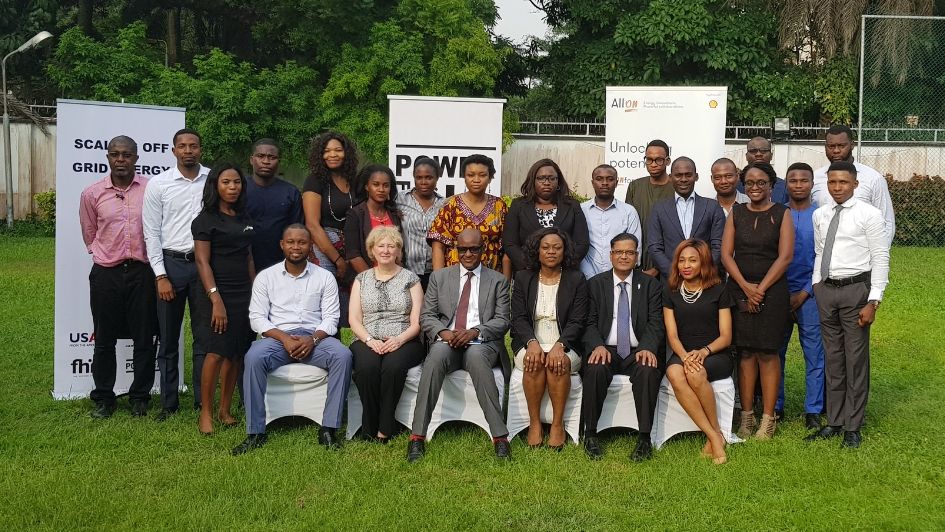Nigeria’s Decentralized Renewable Energy (DRE) Taskforce, which aims to accelerate modern electricity access initiatives by tackling the most pressing industry challenges, met on November 12, 2018 to review the impact of its activities since its inception in February 2018.
The meeting was attended by 24 members and reviewed the taskforce goals in order to measure success and explore what action is still required.
The taskforce is part of the Scaling Off-Grid Energy (SOGE) Grand Challenge for Development, which is implemented in Nigeria under a partnership between the US Global Development Lab, Power Africa, USAID-Nigeria, FHI360 and Power for All. SOGE aims to provide 20 million households in Sub-Saharan Africa with access to modern, clean and affordable electricity through distributed solutions.
The taskforce is divided into working groups focused on five core challenges for the sector namely: (i) zero tariffs and duties; (ii) consumer awareness; (iii) collaborative data sharing; (iv) end-user payments and (v) standardization and certification for the sector.
During the meeting, each working group presented its work to the taskforce, based on goals that were set at previous taskforce meetings. The goals achieved by the taskforce included:
-
Sustained engagement with government agencies such as the Ministry of Finance, the Nigeria Customs Service and the National Assembly over the removal of import duties and tariffs on solar panels and components.
-
Successful advocacy to the Central Bank of Nigeria towards achieving simplified consumer payment systems with the release of regulations for the establishment of Payment Service Banks (PSBs) which will enable the use of mobile money and other digital finance solutions.
-
The launch of the Platform for Energy Access Knowledge, Power for All’s online interactive database for the DRE sector, and the familiarization of the taskforce members with the platform.
-
Reviewing the Minimum Expected Performance Standards (MEPS) of components and equipment with a view to working with relevant stakeholders for standardization of components and equipment, and in certification programs.
-
Increased consumer awareness through appearances in over 50 media outlets cutting across print, broadcast and digital media; as well as in participation on panels at about 10 events.
This review came as the first phase of the SOGE project draws to an end. It afforded the taskforce an opportunity to take stock of the challenges it confronted since its creation. The taskforce also proposed action steps that will further help to achieve the goals that were defined from inception, comprehensively tackle the challenges of the sector and accelerate its growth.
These include:
-
Renewing efforts to have the taskforce engage with the Financial Inclusion Secretariat of the Central Bank of Nigeria (CBN) in order to ensure that the input of the sector is made into efforts to increase financial inclusion and providing simplified consumer payment solutions to the unbanked, mostly unelectrified population.
-
Renewing efforts to aggregate market data from different sources onto PEAK while also testing the data for credibility, preferably through a peer-review system.
-
Seeking tax rebates for local assembling of panels and components, as well as intensifying advocacy for removal of import duties and tariffs by highlighting the number of jobs created and revenue generated through DRE solutions.
-
Increasing consumer awareness by more engagement through the media and events. There is also need to highlight the success stories of DRE solutions from consumer perspective to change the narrative in many quarters that renewable energy is ineffective.
-
Sustaining support to the Renewable Energy Association of Nigeria (REAN) to enable it to better collaborate with other stakeholders on certification programs and standards for the sector.
The taskforce intends to continue critically looking at how to drive the adoption of decentralized renewable energy in Nigeria in order to provide clean, modern energy to the 93 million people in the country that currently live in energy poverty.
Other components of the SOGE project are DRE 101 workshops with state-level policymakers in the six geopolitical zones of the country.
For more information, visit the Nigeria information hub on the Power for All website at www.powerforall.org/nigeria
Mark Amaza is the Nigeria Lead on Strategic Communications and Research at Power for All.
